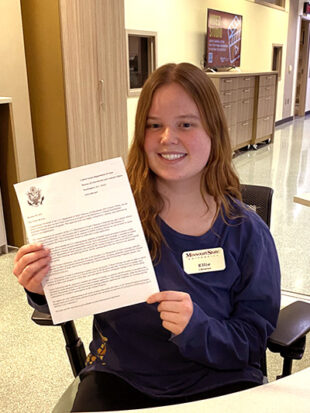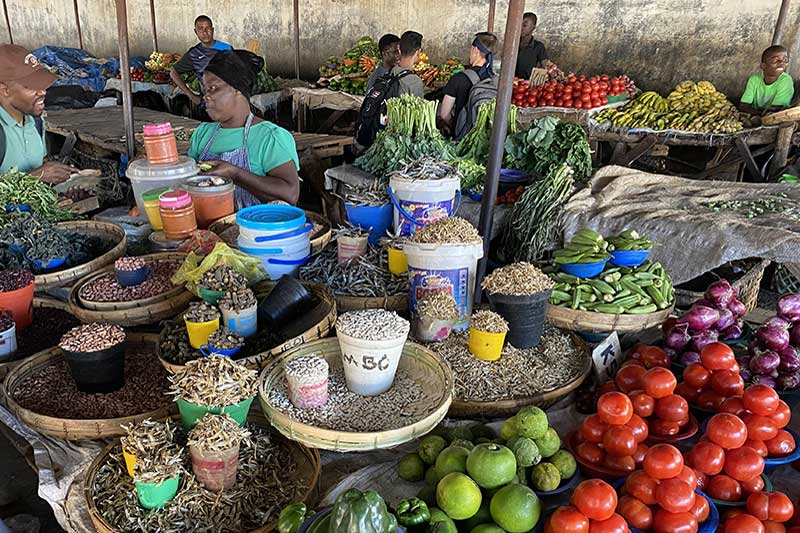Nine students, five representing various programs within the Judith Enyeart Reynolds College of Arts, Social Sciences and Humanities (RCASH), have been awarded the Benjamin A. Gilman International Scholarship for the 2024 Zambia Education Abroad program.
The nine recipients are Ellie McAvin (Anthropology), Kendall Platner (History Education), Destiny Shaw (History Education), Noah Maddux (Music Education), Medley Linton (Psychology and Criminology), Rylee Forman (Political Science), Drew Donigan (Information Technology/Cybersecurity), Syed Usman Ali (Cellular and Molecular Biology) and Isabella Robillard (Biology).
McAvin, Platner, Shaw, Maddux, Linton and Forman are all students within the RCASH community.
Gilman a big step toward funding education abroad
Only students who are U.S. citizens and are Pell Grant recipients qualify for a Gilman Scholarship. Students can apply by either the March or October deadlines to be considered for a summer program.
Gilman awards bring much-needed assistance for students who want to participate in an education abroad program, according to Dr. Mary Willis, professor and head of the Department of Sociology, Anthropology and Gerontology.
Willis’ study abroad program in Zambia is just one of several Education Abroad programs offered at MSU. Students applying for a Gilman can use their award toward any of MSU’s Education Abroad opportunities.
“In every year that I have taken students [to Africa], I have had Gilman Scholarship recipients as part of the program,” Willis said. “This past fall of 2023, more students applied for the Gilman than I have ever had apply before – 10 applied and 9 received awards.”
Historically, study abroad has been viewed as an elite activity, according to Willis. The Gilman was created to ensure all students who are interested in international study have the means and opportunity to do so.
By providing assistance to students, the Gilman will ease some of the financial burden of paying for the trip to Zambia, Willis said.
But not all of it.
“The trip is $9,500. Gilman provides from $3,000 to $5,000,” she said.
Students working hard to gain additional funding
The trip’s price tag was a primary reason Kendall Platner, a sophomore history education and anthropology major, applied for the Gilman Scholarship.
“I was motivated by the need for financial assistance to be able to participate in my study abroad,” Platner said. “The scholarship is also a great opportunity and an honor.”
Drew Donigan, a senior information technology/cybersecurity major, is one of the students not from RCASH to win a Gilman Scholarship. He had no idea he might be able to afford education abroad until he learned about the Gilman Scholarship from Willis.
“Honestly, the whole idea of studying abroad felt like a distant dream, mostly because of the ‘I can’t afford it’ assumption,” Donigan said. “Then, out of the blue, Dr. Willis drops this email bomb about the Zambia research program. After that, I knew I had to apply.”
“While the Gilman helps a lot, I will still need to come up with a few thousand dollars. I hope to be awarded more scholarships,” he added.
Proud of having been awarded a Gilman, sophomore anthropology major Ellie McAvin still expressed concern that it might not provide enough funding for the trip.
“I am having to work extra hard to save enough money for the rest of the trip, and I’m unsure if I will be able to make enough,” she said.
Freshman music education major Noah Maddux felt relieved when he learned about his Gilman award, but he, too, is working to locate more assistance.
“I am applying to more scholarships to hopefully cover the remainder of the expense of this trip as well as [doing] lots of packing so that I have enough clothes,” Maddux said.
“Gilman applicants work hard to have the chance to do a study abroad,” Willis said. “In the future, I hope that Missouri State can offer more financial support to students who want to study abroad.”
“The trip, if they can get the resources together, truly changes their lives.”
“Exhausting” application process

Each semester Willis, who has been taking students to Ethiopia or Zambia since 2014, sends eligible students information about the Gilman Scholarship and meets with them in person if they express interest.
McAvin was one of those students. She applied for the Gilman specifically for the opportunity to conduct research in Africa under Willis’ guidance.
“My motivation for applying to the Gilman is the rare research trip to Africa over the summer with Dr. Willis,” McAvin said. “There are not many people that get the chance to go to Africa as a research school trip, and I couldn’t pass up the opportunity.”
During the initial meeting, Willis is very frank with the students. She asks them why they want to go to Africa, explains that it is a research program and that they will be required to conduct both individual and group research, describes the application process as “exhausting,” and tells students that they will both “work hard and play hard.” They will have assignments to complete before, during and after the trip.
“I send them away to think and be sure that they want to begin the process,” Willis said.
Willis launches into full gear when a student decides to apply for the scholarship. She devotes several hours to each applicant, helping them develop their essays according to Gilman criteria.
“I must get them to focus on what their own life experience is as an American and how they could share this,” Willis said.
All applicants are required to write a minimum of three essays for the Gilman scholarship, according to Willis. Students in the STEM disciplines are required to write a fourth “STEM Supplemental Award” essay.
“In every single case, I must help students think about how their essays will be unique and engaging,” Willis explained. “We go through each question, and I have them list ideas for responses. Then I send them away to write.”
Willis said she is continually amazed and humbled by the students as their life stories emerge during the application process.
“Their histories are not just interesting – many have overcome great obstacles to be in college,” she observed.
Research requirement both exciting and terrifying
“Students are often terrified of the research process and worry that they have no experience,” Willis said. “But I remind them that that’s what learning is all about.”
“The Africa program is faculty-led and focused on research,” Willis continued. “Students learn the research process from start to finish, including taking ethical training, gathering and reading relevant academic literature, designing some research questions, collecting data, entering and analyzing data and finally creating a research poster.”
“Our program matches one or two Missouri State students with African student counterparts to help them with language and cultural understanding while they collect data in a community,” she said.
Donigan, who hopes to gain employment in the federal government after graduating, was excited by the prospect of an extensive research project.
“I will be researching the growth of access to the internet as well as modern technology in Zambia and the impact it has had on varying communities represented by all socioeconomic and cultural backgrounds,” he said. “I hope to identify unmet needs in these communities and determine if they could be met through access to internet and modern tech.”
McAvin explained that learning research methods specific to her anthropology major will bring her closer to her eventual goal of joining the Peace Corps.
“Getting the chance to learn the steps of the research process will be beneficial in my future career as an anthropologist,” she said. “I will also get the amount of volunteer hours necessary for applying to the Peace Corps.”
Job shadowing and field research part of the experience
Students will also get the chance to shadow professionals that match or are similar to their own career aspirations.
“For example, health fields want shadowing experiences and in Zambia…students with a health career interest can shadow in a hospital,” Willis explained. “This is true for any professional or career interest and major; we will find a shadowing experience to match student need, including teaching, dentistry, medicine, conservation, art and art education, music and music education.”
Sophomore history education major Destiny Shaw is looking forward to job shadowing. “This experience will help with my studies and career goals because I am an education major looking to be the best teacher I can be,” she said.
As history education majors, both Shaw and Platner expressed excitement about the opportunity to observe Zambian education and culture and to conduct field research.
“I hope to encounter other ways young adults and kids are taught in other countries around the world compared to the U.S.,” Platner said. “I expect to gain a new sense of respect towards other cultures and open my eyes…to other things around the world.”
Maddux believes the Zambia trip will improve his teaching skills as well. “I expect to gain a greater appreciation and understanding of music education in third world countries and how music can affect a community,” he said. He also looks forward to “lots of new experiences like interviewing primary school students in a third world country.”

Anticipating new cultures and experiences
The students already understand they will confront new cultural differences and experiences. Still, the opportunity to study abroad overshadows their fears.
“I am fearful, naturally, of going to some place new with people I simply do not know,” noted Maddux, whose family told him he was “very lucky” to have been given this opportunity. “I have never been a big traveler and have never left the United States, so I am very excited to start meeting my colleagues on this trip as well as the people, students and teachers in these schools we will be visiting.”
Donigan described his family as happy, proud, and even a little jealous because of the amazing adventure ahead of him in Zambia.
“I’m anticipating not just [gaining] data and research skills but a whole new perspective on the world, plus a crash course in Zambian culture” he said.
Family and friends like Platner’s have generally been supportive but have expressed some apprehension about the trip. On the other hand, Platner said she has no concerns about traveling to Zambia and is “ready and very eager to start.”
Meanwhile, McAvin said she was looking forward to the opportunity to “completely immerse” herself in Zambian culture.
“I have the chance to live in a Zambian household and learn how they cook, clean, interact with each other and relax,” she explained. “From this experience I expect to gain research skills, language skills, adaptability and cultural awareness.”
Platner said she was ready to experience Zambian food and has devoted her spare time to researching the country’s languages, cultures and daily life.
“I can sometimes be a picky eater, so I think this will open me up to new food experiences and broaden my horizons,” Platner said.
Unlike Platner, Shaw expressed some apprehension about Zambian food.
But she has no qualms about traveling to Zambia.
“My family says that it is dangerous,” Shaw observed. “I said that I’m not going to stare out my window my whole life. This is a once-in-a-lifetime opportunity, so I’m going to take it.”
Learn more about Education Abroad
Photos provided by Mary Willis and Ellie McAvin.

